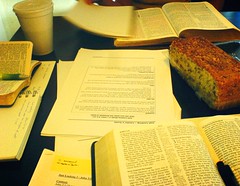Return Ticket on a Runaway Train (John 20)
The penultimate study in the "Just Looking" series on the Gospel of John.
John 20
Q: What event occurs in this chapter?
Jesus is raised from the dead.
Q: From last study, we know that Jesus really died. How do we know he really rose from the dead?
Tomb emptied under unusual circumstances - in itself sufficient for belief (John 20:8)
Appearances to eyewitnesses
Not a ghost but solid flesh still bearing marks of crucifixion. (And certainly not a metaphysical, metaphorical, "Jesus lives on in our hearts" resurrection.)
Q: Resurrection was not a cool party trick, nor a shock and awe tactic to gain friends and influence people. Why does Jesus have to rise again from the dead? (John 20:9)
Because Scripture had spoken hundreds and thousands of years ago about a promised king who would rule forever and also that God's suffering servant would rise from the dead. Therefore, if Jesus was these promised people rolled into one, he needed to do so.
[Because it was not possible for Jesus to be held by death since he was sinless and therefore did not deserve the judgement of death.]
Isaiah 9:6-7 as well as the numerous times God tells David that he will establish his throne forever.
Psalm 16 (cited Acts 2:25-31, Acts 13:35)
Isaiah 53:10ff.
Q: What message does Jesus tell Mary Magdalene to convey to the disciples?
'I am ascending to my Father and your Father, to my God and your God.' (John 20:17)
Q: Why is it important for them to know that Jesus is ascending to God?
Q: What has Jesus told them previously about his coming to earth and returning to the Father?
John 3:13-16 - "No one has ascended into heaven except he who descended from heaven, the Son of Man. And as Moses lifted up the serpent in the wilderness, so must the Son of Man be lifted up, that whoever believes in him may have eternal life. For God so loved the world, that he gave his only Son, that whoever believes in him should not perish but have eternal life."
John 13:3 - "Jesus, knowing that the Father had given all things into his hands, and that he had come from God and was going back to God..."
John 16:28 - "I came from the Father and have come into the world, and now I am leaving the world and going to the Father."
John 17:4-5 - "I glorified you on earth, having accomplished the work that you gave me to do. And now, Father, glorify me in your own presence with the glory that I had with you before the world existed."
Q: What does Jesus' ascension demonstrate about him?
What he says came true - he is not a false prophet. And so what he says about the condition of men, about himself being the only way to be saved, about how his death pays for sins, about his divinity (being equal to the Father) is all true. Jesus' work on earth was done and he would now be glorified.
Q: What does Jesus' ascension tell us about the Father?
That God really loved the world. Jesus' death was the accomplishment of his eternal plan to rescue his people.
Q: What does Jesus' ascension mean for his disciples and the world?
That all who believe in him will have eternal life.
What word does he use to describe his disciples?
brothers
Q:Why does Jesus call them "brothers"?
Q: If brothers, who is their Father?
"my God and your God, my Father and your Father". Not only is there merely salvation from judgement to eternal life, there is also intimate relationship with God! Mindblowing bonus! See John 14, John 16:25-27.
[Q: What is the significance of Jesus' greeting?]
Q: When Jesus appears, what does he give the disciples (John 20:21-23)?
Sending out - commission, Holy Spirit
Q: Jesus promised the Spirit several times while he was alive. Why would the disciples need the Spirit?
To be reborn, to not be condemned, to enter into the Kingdom of God (John 3).
John 14:26 - "the Helper, the Holy Spirit, whom the Father will send in my name, he will teach you all things and bring to your remembrance all that I have said to you."
John 16:13-14 - "When the Spirit of truth comes, he will guide you into all the truth, for he will not speak on his own authority, but whatever he hears he will speak, and he will declare to you the things that are to come. He will glorify me, for he will take what is mine and declare it to you."
Q: How will the disciples be able to carry out their commission?
Q: What exactly were they sent out to do?
Q: Why do we now, more than two millenia later, not need to see Jesus' physically resurrected body or his miracles to believe?
John 20:28-31
Q: How do we know that John the disciple's testimony is true?
Because it is Spirit-aided.
Q: Why do you not believe these words of eternal life?
Where else have we to go
We have come to see,
To know and understand
Things the very angels long to see.
God, who owed us nothing,
Has spoken to us all.
Christ the word of God himself has been.
Chorus
Where else have we to go,
When you alone have words of eternal life?
Where else have we to go,
When you alone have words of eternal life?
2. Words of truth passed down
To those entrusted few
Who witnessed and proclaimed him,
‘Christ the Lord’.
We are their descendants
On us the light has dawned,
Standing in the gospel we first heard.
3. Come all you who labour,
You who are weighed down,
You who thirst and hunger for the right
There is truth and meaning,
Mercy, rest and hope.
True salvation comes through Jesus Christ.
Words and Music: ©1998 Nicky Chiswell
Just Looking Studies
Just Looking Study 1 (John 20:30-31, John 1:1-18)
Just Looking Study 2 (John 3:1-21)
Just Looking Study 3 (John 4:1-30) - from-a-Christian-family version
Just Looking Study 4 (John 5:1-29)
Just Looking Study 5 (John 11:1-57)
Just Looking Study 6 (John 18:28-19:16a)
Just Looking Study 7 (John 19:16b-42)
Just Looking Study 8 (John 20)



















